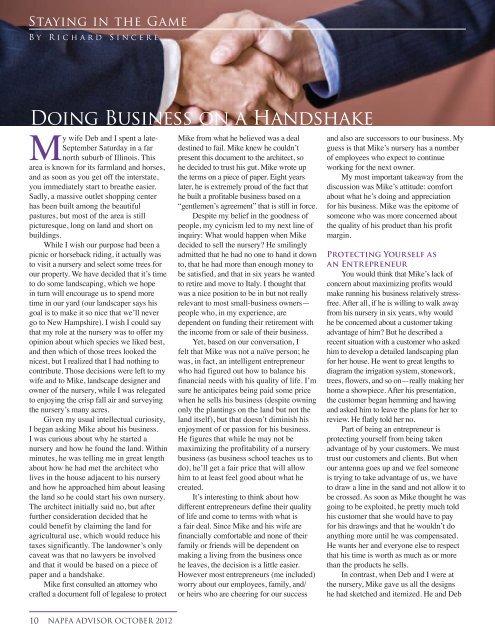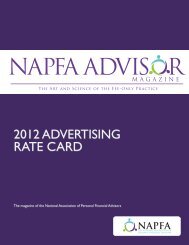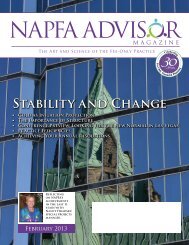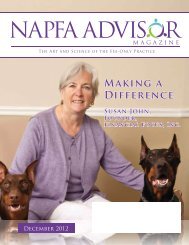Q&A with Kelli Hueler: - Napfa
Q&A with Kelli Hueler: - Napfa
Q&A with Kelli Hueler: - Napfa
Create successful ePaper yourself
Turn your PDF publications into a flip-book with our unique Google optimized e-Paper software.
Staying in the Game<br />
By Richard Sincere<br />
Doing Business on a Handshake<br />
My wife Deb and I spent a late-<br />
September Saturday in a far<br />
north suburb of Illinois. This<br />
area is known for its farmland and horses,<br />
and as soon as you get off the interstate,<br />
you immediately start to breathe easier.<br />
Sadly, a massive outlet shopping center<br />
has been built among the beautiful<br />
pastures, but most of the area is still<br />
picturesque, long on land and short on<br />
buildings.<br />
While I wish our purpose had been a<br />
picnic or horseback riding, it actually was<br />
to visit a nursery and select some trees for<br />
our property. We have decided that it’s time<br />
to do some landscaping, which we hope<br />
in turn will encourage us to spend more<br />
time in our yard (our landscaper says his<br />
goal is to make it so nice that we’ll never<br />
go to New Hampshire). I wish I could say<br />
that my role at the nursery was to offer my<br />
opinion about which species we liked best,<br />
and then which of those trees looked the<br />
nicest, but I realized that I had nothing to<br />
contribute. Those decisions were left to my<br />
wife and to Mike, landscape designer and<br />
owner of the nursery, while I was relegated<br />
to enjoying the crisp fall air and surveying<br />
the nursery’s many acres.<br />
Given my usual intellectual curiosity,<br />
I began asking Mike about his business.<br />
I was curious about why he started a<br />
nursery and how he found the land. Within<br />
minutes, he was telling me in great length<br />
about how he had met the architect who<br />
lives in the house adjacent to his nursery<br />
and how he approached him about leasing<br />
the land so he could start his own nursery.<br />
The architect initially said no, but after<br />
further consideration decided that he<br />
could benefit by claiming the land for<br />
agricultural use, which would reduce his<br />
taxes significantly. The landowner’s only<br />
caveat was that no lawyers be involved<br />
and that it would be based on a piece of<br />
paper and a handshake.<br />
Mike first consulted an attorney who<br />
crafted a document full of legalese to protect<br />
Mike from what he believed was a deal<br />
destined to fail. Mike knew he couldn’t<br />
present this document to the architect, so<br />
he decided to trust his gut. Mike wrote up<br />
the terms on a piece of paper. Eight years<br />
later, he is extremely proud of the fact that<br />
he built a profitable business based on a<br />
“gentlemen’s agreement” that is still in force.<br />
Despite my belief in the goodness of<br />
people, my cynicism led to my next line of<br />
inquiry: What would happen when Mike<br />
decided to sell the nursery? He smilingly<br />
admitted that he had no one to hand it down<br />
to, that he had more than enough money to<br />
be satisfied, and that in six years he wanted<br />
to retire and move to Italy. I thought that<br />
was a nice position to be in but not really<br />
relevant to most small-business owners—<br />
people who, in my experience, are<br />
dependent on funding their retirement <strong>with</strong><br />
the income from or sale of their business.<br />
Yet, based on our conversation, I<br />
felt that Mike was not a naïve person; he<br />
was, in fact, an intelligent entrepreneur<br />
who had figured out how to balance his<br />
financial needs <strong>with</strong> his quality of life. I’m<br />
sure he anticipates being paid some price<br />
when he sells his business (despite owning<br />
only the plantings on the land but not the<br />
land itself), but that doesn’t diminish his<br />
enjoyment of or passion for his business.<br />
He figures that while he may not be<br />
maximizing the profitability of a nursery<br />
business (as business school teaches us to<br />
do), he’ll get a fair price that will allow<br />
him to at least feel good about what he<br />
created.<br />
It’s interesting to think about how<br />
different entrepreneurs define their quality<br />
of life and come to terms <strong>with</strong> what is<br />
a fair deal. Since Mike and his wife are<br />
financially comfortable and none of their<br />
family or friends will be dependent on<br />
making a living from the business once<br />
he leaves, the decision is a little easier.<br />
However most entrepreneurs (me included)<br />
worry about our employees, family, and/<br />
or heirs who are cheering for our success<br />
and also are successors to our business. My<br />
guess is that Mike’s nursery has a number<br />
of employees who expect to continue<br />
working for the next owner.<br />
My most important takeaway from the<br />
discussion was Mike’s attitude: comfort<br />
about what he’s doing and appreciation<br />
for his business. Mike was the epitome of<br />
someone who was more concerned about<br />
the quality of his product than his profit<br />
margin.<br />
Protecting Yourself as<br />
an Entrepreneur<br />
You would think that Mike’s lack of<br />
concern about maximizing profits would<br />
make running his business relatively stressfree.<br />
After all, if he is willing to walk away<br />
from his nursery in six years, why would<br />
he be concerned about a customer taking<br />
advantage of him? But he described a<br />
recent situation <strong>with</strong> a customer who asked<br />
him to develop a detailed landscaping plan<br />
for her house. He went to great lengths to<br />
diagram the irrigation system, stonework,<br />
trees, flowers, and so on—really making her<br />
home a showpiece. After his presentation,<br />
the customer began hemming and hawing<br />
and asked him to leave the plans for her to<br />
review. He flatly told her no.<br />
Part of being an entrepreneur is<br />
protecting yourself from being taken<br />
advantage of by your customers. We must<br />
trust our customers and clients. But when<br />
our antenna goes up and we feel someone<br />
is trying to take advantage of us, we have<br />
to draw a line in the sand and not allow it to<br />
be crossed. As soon as Mike thought he was<br />
going to be exploited, he pretty much told<br />
his customer that she would have to pay<br />
for his drawings and that he wouldn’t do<br />
anything more until he was compensated.<br />
He wants her and everyone else to respect<br />
that his time is worth as much as or more<br />
than the products he sells.<br />
In contrast, when Deb and I were at<br />
the nursery, Mike gave us all the designs<br />
he had sketched and itemized. He and Deb<br />
10<br />
<strong>Napfa</strong> Advisor October 2012







